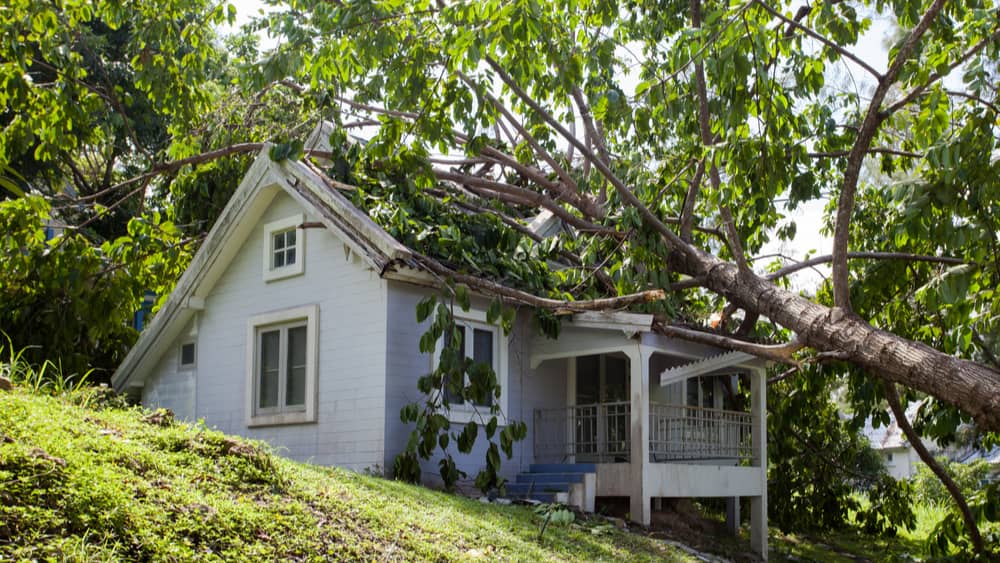
Image, Shutterstock
NASHVILLE – The Tennessee Department of Commerce and Insurance (TDCI) is sharing important consumer information about filing insurance claims, hiring contractors for home repairs, home safety and avoiding scams with Tennessee residents who may have sustained home or auto damage from the storms that swept across the South and through Tennessee on Thursday, March 25, 2021.
Thursday’s severe weather produced high winds, hail and heavy rain that knocked out electric power for thousands and caused damages to homes and vehicles across Tennessee. To aid consumers’ recovery efforts, TDCI is providing tips to aid Tennesseans when filing their insurance claims, selecting contractors and avoiding scammers who might prey on storm victims.
Filing Insurance Claims:
- File your claim as soon as possible. Call your insurance company or agent with your policy number and other relevant information. Your policy may require that you make the notification within a certain time frame.
- If your home is damaged to the extent that you cannot live there, ask your insurance company if you have coverage for additional living expenses.
- Document the damages by taking photographs or video of any damage for each instance your home or property was damaged.
- Make the temporary repairs necessary to prevent further damage to your property (cover broken windows, leaking roofs and damaged walls).
- Never have permanent repairs made until your insurance company has inspected the property and you have reached an agreement on the cost of repairs. Be prepared to provide your claims adjuster with records of improvements you made prior to the damage.
- If you feel that you are unfairly denied a claim by your insurance company, consumers should file a complaint with TDCI.
What Damage to Your Home is Covered?
Damage caused by wind, wind-driven rain, trees or other falling objects are all covered under most standard homeowners policies. Check your policy and call your insurance agent or company if you need clarification or have specific questions.
What Damage to Your Home is Not Covered?
The following events are typically not covered by the standard homeowners insurance policy: Interior water damage from a storm, when there is no damage to the roof or walls of your home; damage as the result of a flood; removal of fallen trees (if the trees do not land on and damage your home); food spoilage due to a power outage; and water damage from backed-up drains or sewers. Some insurers offer endorsements (i.e., additional protection that may be purchased) for certain coverages not covered under the standard homeowner policy. Check with your agent or company to determine your needs.
If you have a dispute with your insurer about the amount or terms of the claim settlement or questions about filing a claim or about your insurance policies, contact our team at (615) 741-2218 or 800-342-4029. File a complaint online here.
Generator Safety, Avoiding Carbon Monoxide Poisoning:
During power outages, many people may rely on portable fuel-powered generators which are potential sources of carbon monoxide. Carbon monoxide is an odorless, colorless gas created when natural fuels burn incompletely. Breathing high levels of carbon monoxide can cause loss of consciousness or even death. The Tennessee State Fire Marshal’s Office reminds Tennesseans to never use a gas generator inside a home, garage, carport basement, crawlspace or outside near a window, door or vent. A generator should only be used outdoors and at least 15 feet away from buildings. It is dangerous to use a gas or kerosene heater inside a home or other building.
Have flashlights and battery-powered lighting ready to use during a power outage. If you must use candles for lighting, never leave them unattended and keep them at least 3 feet away from anything that could burn.
Hiring a Contractor:
- Remember that a contractor’s license is required before bidding or price negotiations when the total cost of the project is $25,000 or more.
- For work that costs less than $25,000, check with your local government’s building codes office to confirm whether a contractor needs a state license or local license to perform home improvement, electrical, plumbing or HVAC work, as well as their permit requirements for inspections.
- Before selecting a professional, ensure they are properly licensed for the project by visiting verify.tn.gov.
- Get several bids and check references before committing to a contractor.
- Be wary of contractors selling repairs door-to-door, especially when they ask to receive payment upfront or offer deep discounts.
- Generally, do not pay more than 1/3 of the cost upfront and make sure you have the terms of payment in writing.
- If you are dealing with a company or person who promises to remove debris from your property, ask them to list the services they will provide in writing.
- Ensure that your contract provides for you to make an inspection and approve the work before making the final payment.
- Tennessee’s felony theft law covers consumers whenever a contractor takes money and fails to perform work within 90 days. Pursuant to T.C.A. 39-14-105, consumers may contact local law enforcement and file charges to prosecute the contractor for theft. More information about the law can be found here.
- Consumers can check the complaint and disciplinary history of a contractor by contacting the Board for Licensing Contractors by phone at (800) 544-7693 or (615) 741-8307 or emailing our team at contractors.home-improvement@tn.gov. To file a complaint, consumers should visit our website at tn.gov/commerce.
Avoiding Severe Weather Contractor Scams:
While many people seek to help after severe weather — unfortunately, there is also an increased risk for scams and fraud. Watch out for:
- Upfront fees to help you claim services, benefits or get loans. No federal or state government agency charges application fees for services or benefits.
- Con artists posing as government employees, insurance adjusters, law enforcement officials, or bank employees. Confirm credentials by calling the agencies if necessary.
- Organizations with names similar to government agencies or charities.
- Limited time offers. Don’t be pressured to make a decision on the spot or to sign anything without having enough time to review it.
- Fake rental listings. If the offer sounds too good to be true or the property owner can’t show you the property beforehand, it’s a bad sign.
TDCI reminds consumers of the following:
- Never sign over your insurance check for rebuilding, do not pay with cash or pay the total charges before the work is complete.
- State home improvement law prohibits contractors from asking for a down payment of more than 1/3 of the total contract.
- Only conduct business with licensed insurance agents and contractors. To verify an insurance license, visit the National Association of Insurance Commissioners.






